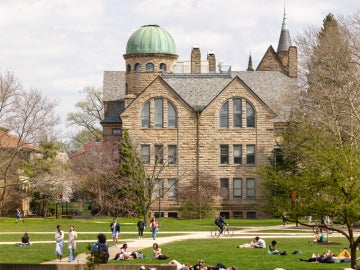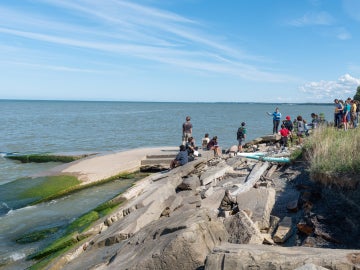Obies Helping Obies
September 12, 2017
Amanda Nagy

As part of the revamped academic advising model launched this fall, first-year students are receiving added support from the Peer Advising Leaders program.
Photo credit: Dana Hamdan
First-year students benefit from more robust academic advising and new peer mentoring program.
The first semester of college is rife with anticipation and uncertainties. As early as orientation week, a number of seemingly benign factors can make a big difference for a new student’s academic success: finding a welcoming community of support, selecting the right combination of classes, and even locating the right study spot.
The revamped academic advising model launched this fall aims to transform the first-year advising experience in the College of Arts and Sciences. As part of the overhaul, advising is now administered by deans and staff members in the rebranded Academic Advising Resource Center and Office of the Registrar (AARC).
Oberlin’s recent strategic plan calls for the enhancement of academic advising, starting with the first-year experience. “We have high expectations for making advising at Oberlin a leading model for liberal arts colleges,” says David Kamitsuka, senior associate dean of the College of Arts and Sciences.
Kamitsuka explains that the redesign is informed by research conducted by an advising task force that reviewed Oberlin students’ advising experiences and best practices at other schools. The information came from direct surveys of students and advisors and consultations with advising-related offices on campus. The task force found that although the majority of first-year students reported positive advising experiences, 94 percent of them wanted more advising support throughout the semester. The task force then set out to design a new advising model with specific learning goals and the intent of developing meaningful relationships between advisors and students.
“One of the biggest changes from the old model is that the AARC is for both students and advisers,” says Liz Clerkin, director of the AARC and associate dean of academic advising. “We’re not simply disseminating information about policies. We’re trying to support advisors and students in the task of achieving skills necessary for integrative learning.”
Every First-Year Student has a ‘PAL’
To meet the need for additional support throughout the semester, the task force also recommended the creation of the Peer Advising Leaders program (PAL), which pairs groups of first-years with trained peer mentors. At the heart of the program, PAL cohorts instill a sense of community and belonging among first-years.
This fall, the vast majority of arts and sciences and dual degree first-year students have opted to enroll in Introduction to Oberlin Life and Learning, a one-credit, cocurricular course that builds upon Orientation week activities and is being piloted this fall. Led by peer advising leaders, the course continues throughout the semester with six required sessions coinciding with key academic dates. The sessions cover topics such as study strategies, time and semester management, academic integrity, how to prepare for winter term, mapping out the second semester, and planning for students’ meetings with their academic advisor.
Dana Hamdan, associate dean of students and director of the PAL program, said she received an outpouring of requests from students who had previously opted out after word spread about the course during Orientation week.

“First-year students were able to experience why Oberlin matters, and how they can make the most out of their educational experience, because they met advanced students who care,” Hamdan says. “I think it also helped that we tried to establish identity among the 46 different cohorts.”
Hamdan explains that the cohorts are named after trees to recognize the unique attributes that each group brings to Oberlin and the opportunity to experience the power of community and coalition building. “The idea is to remind us that we can reach for the stars only because we are firmly rooted in the soil.”
Hamdan and her team invited applications for peer advising leaders last spring. Of the 120 who applied, 54 were selected. They come from a variety of majors and class years, and among them are athletes and students from underrepresented communities. In return, they develop leadership and communication skills—and true to the Oberlin ethos, they’re helping someone along the way.
“If you think about what it means to be an Obie, this program captures it,” Hamdan says. “It’s all about Obies helping Obies.”
Kira Findling, a peer advising leader and third-year comparative American studies major, says she appreciates the opportunity to share her knowledge in a formal capacity.
“Navigating advising at the beginning of college can feel overwhelming, and I think that having a peer by your side can be comforting, especially if students feel a little nervous speaking to faculty in the beginning,” says Findling, who is from Sebastopol, California. In her own experience, the older students she met during her first semester made a positive impact.
“When they waved to me around campus or stopped to ask how I was doing, it made me feel noticed and important in this new and strange place. I want to play that role for younger students and therefore encourage a campus culture of support.”
Being a peer leader has made her feel more connected to other students on campus.
“PALs are helping to build a community in which all students look out for one another,” Findling says. “I'm learning so much about what it means to be an Obie through discussions with other students, and I'm becoming even more familiar with campus resources. I really believe that I'm learning as much from this process as the first-year students are.”
You may also like…
Oberlin Launches Critical AI Studies Minor in Fall 2026
With a solid foundation in both science and the humanities, this minor ensures students to understand and be able to analyze the ethical, cultural, environmental, political, economic, technological, and labor effects of AI.
Research Roundup
Every day, Oberlin’s faculty and students produce scholarly work that uncovers new insights into how we understand the world, particularly in the areas of sustainability and the environment.
Three Things with Jillian Scudder
Oberlin’s astrophysicist-author shines a light on our dark universe.


